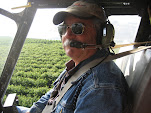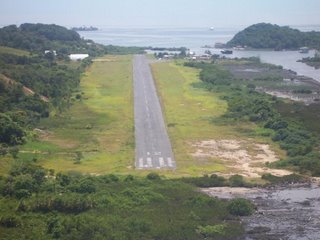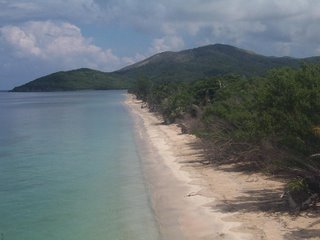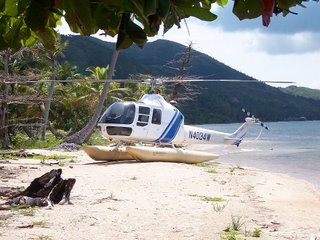(Not bad, huh?)
The weather in Guanaja, Honduras is uncharacteristically crummy this weekend. Fortunately, I have nothing to do except some work on the helicopter that will just have to wait. I can’t even fly it to the airport and put it in the hangar to work on it because the company King Air is already there taking up that space. They’ll both fit, but the helicopter has to go in first.
Today is dismal and rainy, and the wind is out of the north, which it typically is not. Between rain bands, I found myself an unoccupied hammock and settled in with the latest issue of FLYING Magazine.
On one of the helicopter internet discussion boards that I haunt, we often discuss the merits of the career of helicopter flying as opposed to other types of flying. Although there are many jobs within the fixed-wing world, the usual other alternative (as if there is no other) is flying for the airlines. To many helicopter pilots, airline flying seems humdrum and dull…horribly, unbearably boring and unchallenging. And therefore unsuitable as a career choice. Me, I don’t know. I fly both and like both.
In the latest FLYING Magazine, columnist Dick Karl writes about a series of flights he took in the jumpseat of an American Airlines Boeing 757 piloted by fellow columnist Les Abend. They had to go through a big run-around through various agencies for all the permissions required for such a ride-along. I’m sure American expected a big feature article with pictures of their shiny airplanes in picturesque locales. Instead, they got an expanded version of Dick Karl’s regular monthly column. Oops.
The four-day trip began in Ft. Lauderdale, Florida with stops in San Juan, P.R., Orlando, Fl., Boston, Ma., San Juan (again) and then back to Ft. Lauderdale. It is informative on many levels.
Yes, airline flying is routine; by its nature it must be so to guarantee a certain level of safety through standardization. But that doesn’t mean that airliners can be flown by robots. There are still humans up there in the pointy end, always more than one of them. Les and his copilot on that trip matrix had flown together a lot, and their friendship comes through. It’s nice, flying with someone you get along with and whose company you enjoy. Yes, the inside jokes get predictable, but that happens with any small group of people.
The amateur psychologist in me suspects that a common trait among helicopter pilots is a dislike of the participation in team sports. It is often said (by us!) that we are loners or “lone wolves” and I believe that to be true. Something in our psyche makes us not like working/playing so closely with others. To really enjoy airline flying, one must necessarily enjoy working in concert with someone who is, for all practical purposes, a co-equal.
After reading the magazine, I was on my way back to my house when one of our guests stopped me. “How long have you been flying helicopters?” he asked. I had to think. My first flying job was…what…1980? While I sorted it out he said, “Must be a long time if you have to think about it, huh?” Yeah, it’s been a long time all right.
The question and the article made me think back on my career. I’ve always flown by myself, with the exception of one short stint I did as an copilot in a Sikorsky S-58 helicopter back in the very beginning. I’ve missed the camaraderie that goes with airline flying. I miss the going-places aspect typical of fixed-wing (especially airline) flying. And I usually only realize that I’ve missed those things when I read articles like the one in this month’s FLYING.
On the other hand… I’ve flown a couple of times in our King Air with Mike, our fixed-wing pilot. He has a bazillion hours, is a great pilot…former C-130 Herc and DC-8 driver…a great guy and he is becoming a good friend. But oddly, we do not fly together well. In the cockpit Mike is a one-man show and does not need a “copilot.” I’m a pretty fair pilot too, but I’ve also been a one-man show for too long now. I doubt I could change if I wanted to.
As I reach the top of the stairs of my unit above the boathouse, just before I go through the door my view is directly out on the helipad. There sits my bird, strapped down against the tropical squalls, no flying today. I stop and stare at it for a bit, pondering my fate and the choices I’ve made. I cannot complain, I mean really. I love flying helicopters and I thank God that I still get to do it with proficiency and skill. But still, I do wonder about other paths I could have taken and where they would have lead? I wonder if I would have been successful as an airline pilot or if my “lone-wolf” personality would have surfaced and made me miserable? Too late to ask such questions, and it doesn’t matter anyway, does it?





